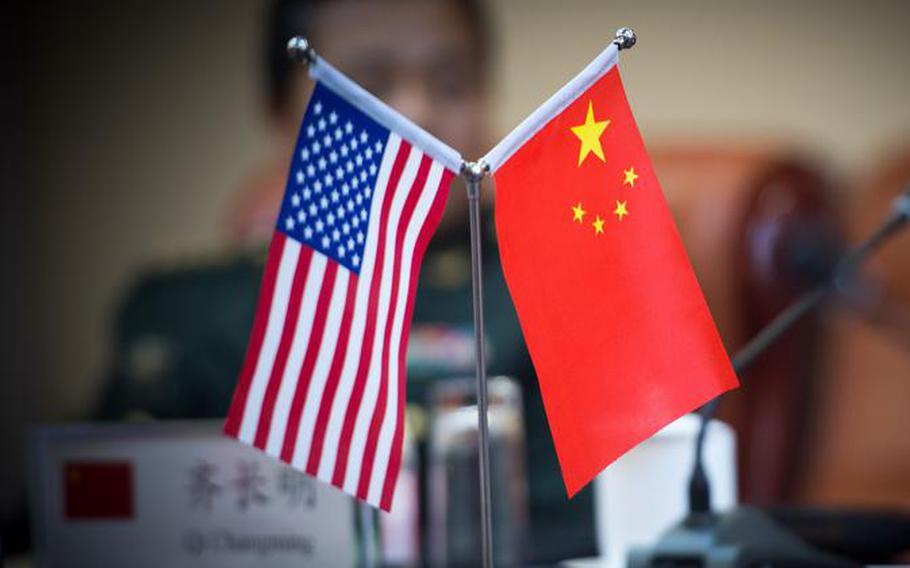
United States and China flags (U.S. Army)
Without adequate wireless spectrum America is at a huge security disadvantage relative to its major competitors such as China. U.S. global leadership is at stake right now, a time of high security and economic tensions in various regions and ever-growing competition with our adversaries on multiple fronts.
Spectrum refers to the invisible airwaves that make wireless communication possible. A balanced spectrum policy that embraces different spectrum use cases remains important for the future. But current mid-band spectrum allocations in the U.S. provide inadequate amounts of licensed spectrum to support future wireless network development.
As the U.S. wavers, or some might say dithers, on its future commercial spectrum policy, China is taking decisive steps to clear spectrum in a way that positions them, the second biggest economy in the world, ahead of us. If unanswered, this maneuver is extremely risky for the U.S., as it puts China in a prime position to lead on equipment standards for 5G and beyond.
The U.S. has no defined plan for allocating additional licensed spectrum for 5G or 6G, and the Federal Communications Commission (FCC) currently lacks the authority to auction spectrum for commercial deployment. This is unacceptable.
The U.S. is ceding our traditional leadership role on spectrum allocation. We are facing a real, tangible and substantial spectrum crunch based on projected capacity demands versus current allocation levels. The U.S. currently trails other leading countries in spectrum availability, while China and its allies are quickly identifying additional bands for 5G and beyond, thereby defining the international conversation on spectrum for the future.
When America leads in the development of innovative wireless capabilities and deployment of commercial mobile wireless networks, these new innovations and technologies have dual-use benefits that aid the U.S. military as well as the overarching business structure. The Department of Defense is leveraging commercial wireless technologies to support critical national missions, but this can only go so far in the current situation.
Adequate additional spectrum is necessary for the U.S. to outcompete China and prevent a future in which China, Russia and our autocratic adversaries win, over U.S. and allied technology, in the race to equip the world and steer future communications infrastructure. We cannot cede management of critical spectrum allocation to the Chinese under any circumstances, which is exactly what they aim to achieve.
U.S. and allied leadership in technology and standards development serves not just business interests, but our national security interests as well. This can be accomplished by ensuring trusted vendors and policies are promoted in the global market. Not doing it puts us at risk both economically and from a security standpoint. This all requires active measures to fortify that leadership.
Developing a trusted supply chain of U.S. and allied-based suppliers is the underlying goal of the U.S. interest in global harmonization of spectrum bands. This is the true driver for harmonizing bands for substantially similar use worldwide. It also generally minimizes the threat that high-risk suppliers from foreign adversary nations can use predatory techniques to dominate strategic bands. Given China’s aggressive actions to dominate and control these factors across the globe, equally aggressive steps are needed to stop them from gaining anything close to that domination.
Responding to this aggression requires bold action. But that does not mean reinventing the wheel. Ideas like nationalizing our spectrum networks or abandoning exclusive use licensing altogether should remain on the cutting room floor.
What is needed is a dedicated plan for full-power, licensed spectrum — especially mid-band spectrum — to be distributed by auctions. This would meet the vital commercial and national security needs in a flexible and appropriate manner. Waiting, regardless of the motivation, is unacceptable and dangerous.
The time is now. U.S. leadership in spectrum for licensed commercial use is not only critical for the U.S. economy, but also for our national security. Congress needs to renew the FCC’s auction authority with a pipeline of dedicated spectrum for 5G use now, and 6G going forward.
Steve Bucci, a retired U.S. Army colonel who served as a Special Forces officer and at the Pentagon as deputy assistant secretary of defense, is a visiting research fellow at The Heritage Foundation.